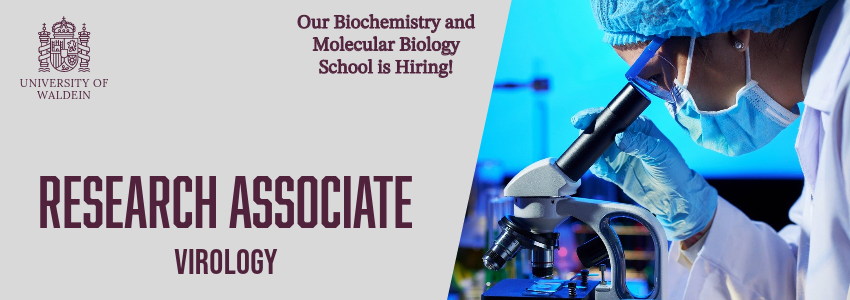Job advertisement: Research associate – Virology

Are you a curious person who likes exploring topics in detail and finding out the facts? Do you look at topics from different angles and perspectives when searching for answers to your questions? Are you passionate about health and science, and making discoveries that will help people? You might be well-suited to a future career in scientific or medical research.
Read the job advertisement for a research associate to get an idea of what this kind of role involves, and what employers look for in applicants.
You will find explanations for text marked with an asterisk (*) below the advertisement. Select the question to reveal the answer. You can also build on some of the skills relevant to the position by following the Learning Lab links at the bottom of the page.

Research Associate – Virology*
University of Waldein
Waldein, Victoria, Australia
Job type: Full Time
Remuneration: $76,927 – $99,302 p.a. plus 17% super
University of Waldein’s Virology lab is conducting leading research on the formation of viruses related to human health. It strives to answer questions as to how these pathogens develop and evolve by utilising structural biology software*. The lab, which is part of the School of Biochemistry and Molecular Biology, collaborates with local government and commercial partners in the vaccine field.
The Research Associate will assist the Research Fellow* in experimentation and analysis to support and expand UoW’s research efforts. The Associate will help the Fellow conduct their own specialist research.
Key responsibilities:
- Assistance in the conduct of research, either independently with the Research Fellow or as part of a wider team
- Assistance in performing administrative tasks, and contribution to the production of conference and seminar papers
- Involvement in professional activities such as attending meetings, seminars, and conferences (both online and in-person)
- Assistance in the experimental design and operation of advanced laboratory and technical equipment
Key selection criteria:
Education/Qualifications:
The appointee will have:
- A Bachelor’s degree or higher qualifications in the relevant discipline*
Knowledge and skills:
- Good understanding of structural and molecular biology, preferably specialising in molecular virology
- Demonstrated ability to analyse information and prepare research papers and manuscripts*
- Ability to think critically, with demonstrated problem-solving skills
- Excellent planning and organisational skills, with a demonstrated ability to effectively prioritise multiple tasks and set and meet deadlines
- Excellent written communication, with a demonstrated ability to write clear and concise research reports and documents
- Ability to work well collaboratively and interact in an appropriate, professional manner both online and in person
- Demonstrated computer skills and proficiency in utilising structural biology software to produce high-quality work, with a willingness to learn new programs and software as necessary
Other job-related information:
- You may be required to travel between other campuses of the University
- During peak periods of work, leave-taking may be restricted
To apply for this position, please submit your CV, along with a cover letter outlining how you meet each of the key selection criteria.
Drag the slider to see some examples of 3D models of viruses made using computer software.
Reflect
- Which parts of the ‘key skills’ and ‘key selection criteria’ do you think could apply to any type of research associate position?
- Which parts do you think are specific to this role?
This is just one example of the type of research position in the health sector. If viruses aren’t your area of interest, but you think you’d like to do research in another area, keep this career in mind.
Here are just a few other areas of health and medical research being undertaken in Australia in 2022 and 2023:
- How Indigenous primary health care services can be improved
- Using phone applications to improve youth mental health
- Autoimmune diseases and human genome sequencing.
Sources:
National Health and Medical Research Council (2022) Thirteenth Edition 10 of the Best NHMRC Research Projects, NHMRC website, accessed 19 January 2023. https://www.nhmrc.gov.au/about-us/publications/10-best-nhmrc-research-projects-thirteenth-edition
Black Dog Institute (2023) Youth mental health, Black Dog Insitute website, accessed 23 January 2023. https://www.blackdoginstitute.org.au/research-areas/youth-mental-health/
Learn more on Learning Lab
- Being able to think and act critically is an important and necessary skill for your studies, career, and everyday life. Learn more about this skill and how you can develop it in the Introduction to critical thinking tutorial. (10 – 60 minutes)
- Explore the Choose valid sources pages to learn how to find credible and high-quality information when doing research. (15 – 65 minutes)
- When putting together a presentation or a written task, it’s vital to consider the characteristics of your audience. The Understanding your audience tutorial will give you some tips on choosing the best way to convey your message and keep your audience engaged. (15 minutes)
- Academic researchers frequently present their work to colleagues and larger audiences, and these days that is often online. Check out the Online presentations tutorial to start learning the basics. (25 minutes)
Return to the job board…
Per annum = each year
Referred to either as 'superannuation' or just 'super'. During your working life, your employer/s must pay an amount of money into a special account every time you are paid your salary. For example, in 2023, if you make $70,000 per year, Australian employers must pay at least $7,350 per year into your super, on top of your salary. This money is for you to live on when you reach pension age and retire.
Critical thinking means examining (analysing) a situation in detail and using evidence to make a judgement (evaluating) from an objective point of view. Critical thinking doesn’t have to be negative all the time, nor does it mean always pointing out the faults in an issue. A good critical thinker asks good questions, recognises and challenges biases (including their own), doesn’t accept everything as true, finds credible sources, and reflects on their own understanding of ideas.
